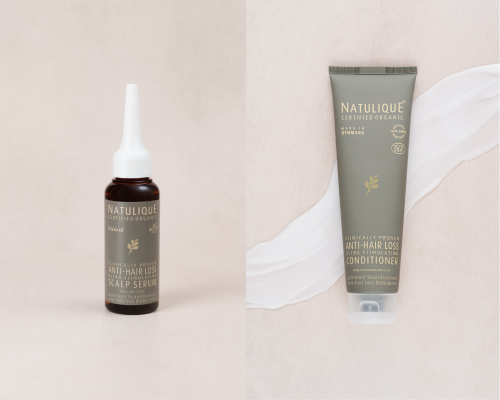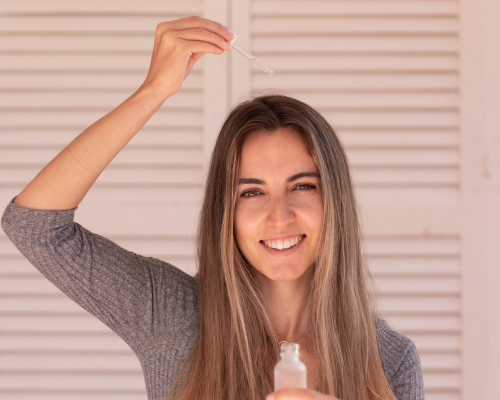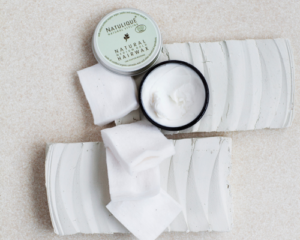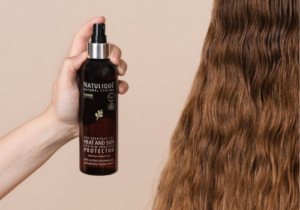Introduction to Hair Loss and Nutrition
Overview of hair loss
Concept of hair loss
Hair loss is a natural part of the hair life cycle. Every day, it's normal to lose between 50 and 100 hairs, as they complete their cycle and make way for new growth. However, when hair loss exceeds this threshold, it can become worrying and indicate an underlying problem. Excessive hair loss can be caused by a variety of factors, including hormonal imbalances, stress, autoimmune diseases and, above all, nutritional deficiencies.
Important facts and figures about hair loss
Hair loss affects a large proportion of the world's population, with around 40% of women and 85% of men experiencing noticeable thinning before the age of 50. Statistics reveal that almost half of individuals suffering from hair loss acknowledge that their problem affects their self-confidence and their daily lives. Hair health is often a direct reflection of our general state of health, and diet plays a crucial role in maintaining healthy, strong hair.
Correlation between nutrition and hair health
The importance of a balanced diet for healthy hair
A balanced diet is essential for good hair health. The nutrients we consume directly influence hair growth and vigor. Proteins, vitamins, minerals and essential fatty acids are key elements in maintaining strong, dense hair. A diet deficient in these elements cannot provide the body with the resources it needs to nourish the scalp and promote the production of keratin, a protein fundamental to hair.
Consequences of nutritional deficiencies on hair health
Nutritional deficiencies can damage hair structure, making it brittle and more susceptible to loss. For example, a lack of iron can reduce blood flow to the scalp, resulting in reduced hair follicle growth. Similarly, a lack of essential vitamins such as B and D can slow hair growth and weaken the hair fiber. While protein deficiencies reduce keratin production, essential fatty acid deficiencies affect hair moisture and shine. The effects of these deficiencies are not limited to growth; they also influence overall hair texture and appearance.
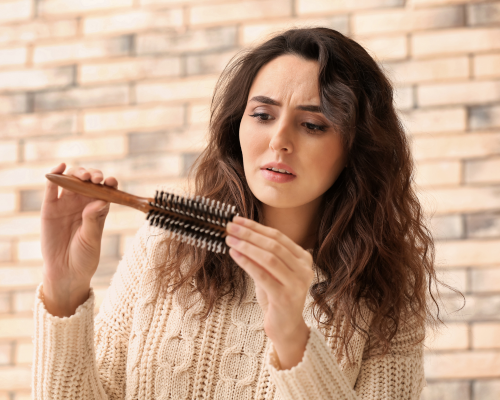
Nutritional deficiencies responsible for hair loss
Iron deficiency
Iron's role in hair growth
Iron is an essential mineral for many bodily functions, including hair health. It plays a crucial role in the production of hemoglobin, a protein that transports oxygen to cells, including those of the scalp. Adequate iron intake ensures optimal oxygenation of hair follicles, encouraging hair growth and regeneration.
How iron deficiency can cause hair loss
Iron deficiency, often due to a diet insufficiently rich in red meat, legumes or green leafy vegetables, can lead to iron-deficiency anemia. This results in reduced oxygenation of the scalp, causing a progressive deterioration in follicle health. As a result, hair becomes dull, fragile and falls out more easily.
Vitamin deficiency
The role of vitamins (B, D, E, etc.) in hair health
Vitamins play a vital role in overall hair health. B vitamins, notably biotin (B7), promote cell growth and keratin production. Vitamin D contributes to hair follicle development, while vitamin E acts as a powerful antioxidant, protecting hair cells from environmental damage. The harmony of these vitamins ensures healthy, strong hair.
How vitamin deficiency can cause hair loss
Vitamin deficiencies can lead to significant hair problems. For example, a lack of vitamin B can cause structural weakening of the hair, making it brittle and fragile. Vitamin D deficiency has been linked to alopecia, a condition characterized by excessive hair loss. In addition, a vitamin E deficiency deprives the scalp of its ability to fight oxidative stress, increasing the risk of hair loss.
Other dietary deficiencies
Protein and essential fatty acid deficiencies
Proteins, the source of amino acids, are the pillars of hair structure. Inadequate consumption, often due to a poorly balanced vegetarian diet or a diet low in animal products, can lead to a reduction in keratin production. In addition, essential fatty acids, such as omega-3, provide hair with suppleness and moisture. Their absence from the diet can lead to a dry scalp and dull hair.
The role of other nutrients in hair health
Other nutrients, such as zinc and selenium, are also crucial to hair health. Zinc contributes to the repair and growth of hair tissue, while selenium plays a role in cellular protection against oxidative stress. Zinc deficiency can slow hair growth, and selenium deficiency can weaken hair resistance, increasing hair loss. A balanced diet must incorporate these nutrients to support optimal hair health.
See also: Brewer's yeast: an ally against hair loss?
Strategies to combat nutritional deficiencies linked to hair loss
Adopt a balanced and varied diet
Include a variety of food groups
One of the first steps in preventing hair loss linked to nutritional deficiencies is to ensure that a diversity of food groups is present on the plate. This includes lean proteins such as chicken or legumes, complex carbohydrates such as brown rice and fresh vegetables, and sources of good fats such as avocados and nuts. This dietary diversity ensures that all the necessary nutrients, including essential minerals and vitamins, are present in the body, contributing to overall hair health.
Opt for iron-rich foods
Including iron-rich foods such as beef, lentils and spinach can help combat possible iron-deficiency anemia, which is often the cause of hair loss. Heme iron, found in animal products, is particularly well absorbed by the body. Individuals following a vegetarian or vegan diet should also be sure to consume foods rich in vitamin C, as these increase the absorption of non-haem iron.
Targeted food supplementation
Consult a health care professional
Before starting any form of supplementation, it is always advisable to consult a healthcare professional or nutritionist. This will help identify any deficiencies specific to each individual, and determine the type and dose of supplements required. Excessive intake of certain supplements can lead to other imbalances, so an informed, personalized approach is crucial.
Hair health supplements
For those unable to meet their nutritional needs through diet alone, specific supplements for hair health may be considered. B-vitamin complexes, iron supplements and omega-3s are often recommended in cases of proven deficiency. In addition, specific formulas containing biotin and zinc can support hair growth and strengthen hair structure.
Adopt a healthy lifestyle
Reduce stress and promote well-being
Chronic stress can exacerbate hair loss. Adopting stress management techniques such as meditation, yoga or even regular exercise can not only improve mental health but also have positive impacts on hair health. Regular sleep cycles and good hydration are also essential elements of a healthy lifestyle that supports hair growth.
Avoid hair-damaging practices
In addition, avoiding aggressive hair care practices, such as excessive use of heat or chemicals, helps keep hair healthy. Combined with a nutritious diet, proper daily hair care can significantly reduce the risk of hair loss. Opting for gentle hair care products suited to your hair type, and regularly incorporating moisturizing treatments, can improve the overall strength and appearance of your hair.
Understanding the Importance of Nutrition for Hair Health
The Impact of Processed Foods
The dangers of ultra-processed foods
Processed foods, rich in additives, refined sugars and saturated fatty acids, can contribute to the body's nutritional depletion. A diet based on industrial products can lead to deficiencies in the essential nutrients needed for healthy hair. Foods low in vitamins and minerals fail to provide the crucial elements needed for hair growth and fortification, and can amplify the risk of hair loss.
How to reduce consumption of processed foods
To promote healthy hair, we recommend limiting consumption of processed foods. Prioritizing whole foods from natural sources is crucial. Opting for home-cooked meals based on fresh vegetables, quality proteins and healthy fat sources is an effective way of reducing the risk of nutritional deficiencies.
Using Superfoods to Boost Hair Health
Superfoods to include in your diet
Superfoods are nutrient-rich and incredibly beneficial for hair health. Foods like berries, spinach, chia seeds and cashews offer a potent cocktail of essential vitamins and minerals. For example, spinach is an excellent source of iron and vitamin C, while berries are rich in antioxidants. Incorporating these superfoods into your daily eating routine can significantly improve hair structure and growth.
Progressive integration and benefits for hair
Gradually incorporating these superfoods into your diet can gradually bring about positive changes in hair texture, making it stronger and less likely to fall out. By continuing these dietary adjustments, you're likely to see improved hair density and shine over time.
FAQ
What are the signs of hair-related iron deficiency?
Iron deficiency can often manifest itself as diffuse hair loss, brittle hair, and sometimes a feeling of extreme fatigue, which can also impact hair health through the stress it causes.
Is biotin really effective in preventing hair loss?
Biotin, or vitamin B7, plays a crucial role in the production of keratin, essential for strong, healthy hair. Although supplementation can help, a balanced diet remains the best practice for preventing deficiencies.
What foods can help strengthen hair in the face of deficiencies?
Foods rich in protein, iron, vitamins B and D, such as fish, eggs, legumes and nuts, help strengthen hair and reduce the risk of hair loss due to deficiency.
Are dietary supplements enough to solve hair loss problems?
Dietary supplements can be useful in cases of proven deficiency, but are no substitute for a balanced, diversified diet, which remains essential for optimum hair health.
How does hydration influence hair health?
Good hydration is crucial, as it keeps the scalp healthy and hair well moisturized, promoting growth and reducing breakage.
